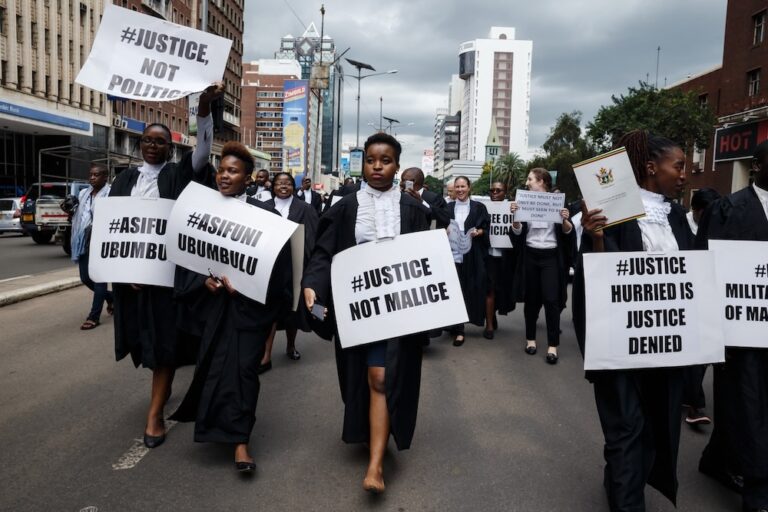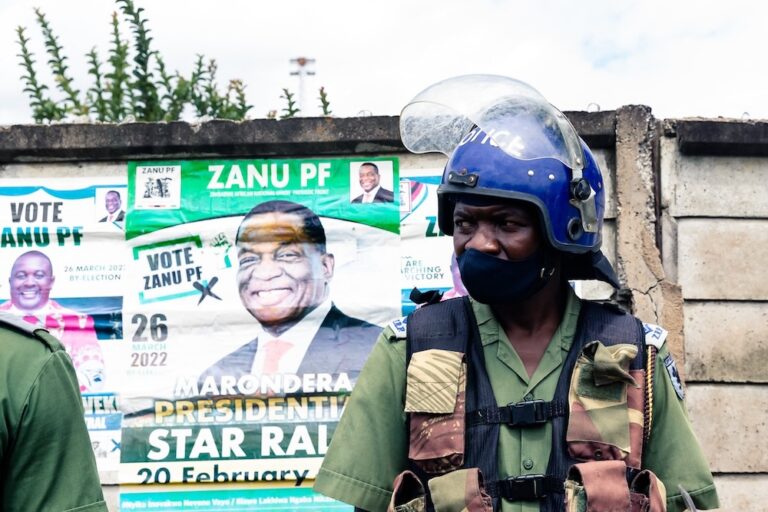(MISA/IFEX) – The following is an 11 August 2005 MISA press release: MISA Communiqué (Zimbabwe, national general meeting) August 11, 2005 Self-regulatory mechanisms for the Zimbabwean media feature prominently on MISA-Zimbabwe agenda The Media Institute of Southern Africa (MISA) Zimbabwe held its annual general meeting (AGM) on August 6, 2005. Chairperson Thomas Deve called on […]
(MISA/IFEX) – The following is an 11 August 2005 MISA press release:
MISA Communiqué (Zimbabwe, national general meeting)
August 11, 2005
Self-regulatory mechanisms for the Zimbabwean media feature prominently on MISA-Zimbabwe agenda
The Media Institute of Southern Africa (MISA) Zimbabwe held its annual general meeting (AGM) on August 6, 2005. Chairperson Thomas Deve called on members to rally behind initiatives aimed at establishing an independent self-regulatory media council following the presentation of the draft Code of Conduct to the government.
In his state of the media address to the AGM, Deve said the envisaged independent media council would go a long way to countering the operations of the government-controlled Media and Information Commission (MIC), whose partisan handling of media issues has seen the closures of the “Daily News”, “Daily News on Sunday”, “The Tribune” and “Weekly Times” newspapers.
He commended the Zimbabwe Union of Journalists (ZUJ), Media Monitoring Project of Zimbabwe (MMPZ) and the National Editors Forum, which are working with MISA-Zimbabwe in spearheading the initiatives for adopting and endorsing the draft Code of Conduct as the precursor to the establishment of the independent media council.
“The draft document which was adopted and endorsed by the ZUJ executive is now our major campaign tool for the introduction of a self-regulated media council,” Deve said.
“In this regard we are expected to play a major role in complementing the efforts by ZUJ. I therefore appeal to our advocacy committees to revalidate the contents of the Code of Conduct and help in ensuring that we solidly stand behind all efforts to institutionalise the self-regulatory council.”
This initiative should not be derailed, especially at a time when the government, through the new Minister of Information and Publicity, Dr Tichaona Jokonya, has welcomed the advances towards the establishment of the envisaged media council following a meeting with the minister and his senior officials under the auspices of the Media Alliance of Zimbabwe (MAZ). MAZ is comprised of MISA, ZUJ and MMPZ.
While he welcomed the new minister’s willingness to engage with the media, Deve expressed concern that the media environment remained restrictive, through the application of laws such as the Access to Information and Protection of Privacy Act (AIPPA), Public Order and Security Act (POSA) and the Broadcasting Services Act (BSA).
“Our position is very clear, AIPPA is a bad law that has seen us lose four newspapers. Our members have experienced humiliation and harassment at the hands of law enforcement agents. Several of our members have been dragged before the courts of law while our offices have almost been reduced to a legal aid clinic because of the number of journalists who visit us seeking legal assistance,” Deve noted.
This has resulted in the setting up of the Media Lawyers Network to co-ordinate MISA-Zimbabwe’s efforts to legally assist journalists who fall afoul of the restrictive media laws throughout the country.
MISA-Zimbabwe, Deve said, remains unshaken in its conviction that laws such as AIPPA, POSA and BSA only help in reducing Zimbabwe’s democratic credentials.
Noting that the state-run broadcaster Zimbabwe Broadcasting Holdings (ZBH) continues to serve parochial interests, he said MISA-Zimbabwe would intensify its campaigns not only to free the airwaves through its Community Radio Initiatives, but to ensure that ZBH is transformed into a truly independent public broadcaster.
“This area, in our opinion, remains critical for our advocacy and social mobilisation work.”
On the issue of MISA-Zimbabwe being attacked as an “agent of Western powers” because it was foreign-funded, the MISA chairperson said there was nothing sinister about its funding as the organisation always presents its audited accounts at its AGMs.
“We reiterate that we are a Zimbabwean outfit whose ideals arise from global concerns for media freedom with special focus on addressing the needs of Zimbabweans using Zimbabwean human resources.”
Urging media practitioners to critically examine their professional conduct and ethics, he assured its membership that MISA-Zimbabwe would not be deterred from continuing to fight for media freedom and freedom of expression.
“No one gives you freedom on a platter. Let us continue the fight by any means necessary within the law,” said Deve.
Meanwhile, the AGM agreed with immediate effect to increase the current MISA annual membership fee of $12 000 (approximately US$0.70) to $200 000 (approximately US$11.4), $150 000 (approximately US$8.6) and $100 000 (approximately US$5.7) for its working members, freelance journalists and students, respectively. The institutional membership fee of $120 000 (approximately US$7) was also increased to $1 million (approximately US$57) annually.


